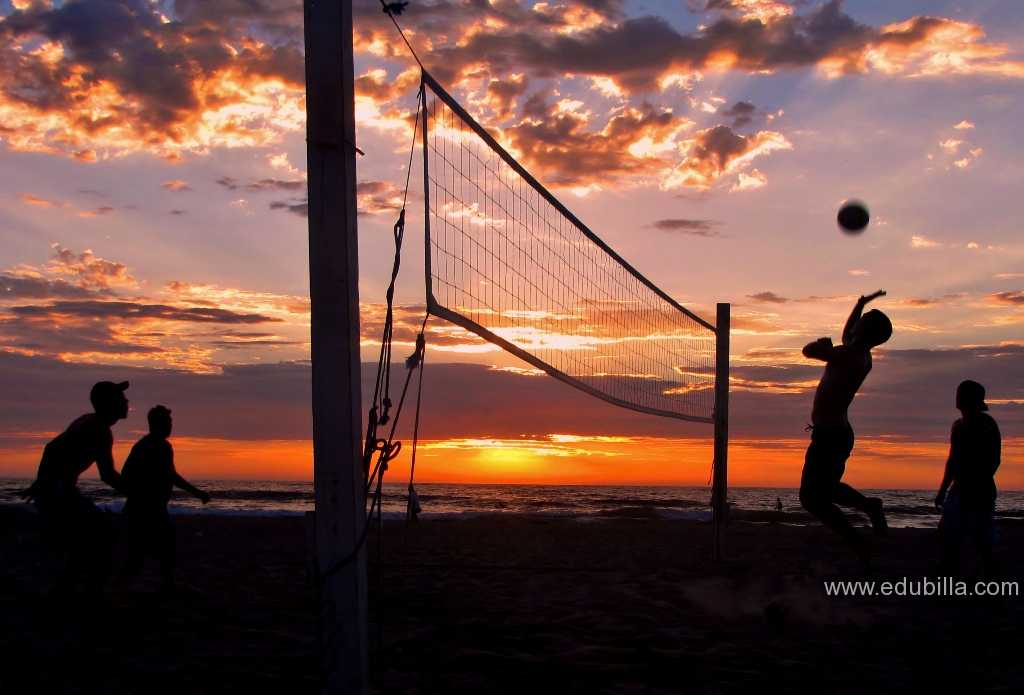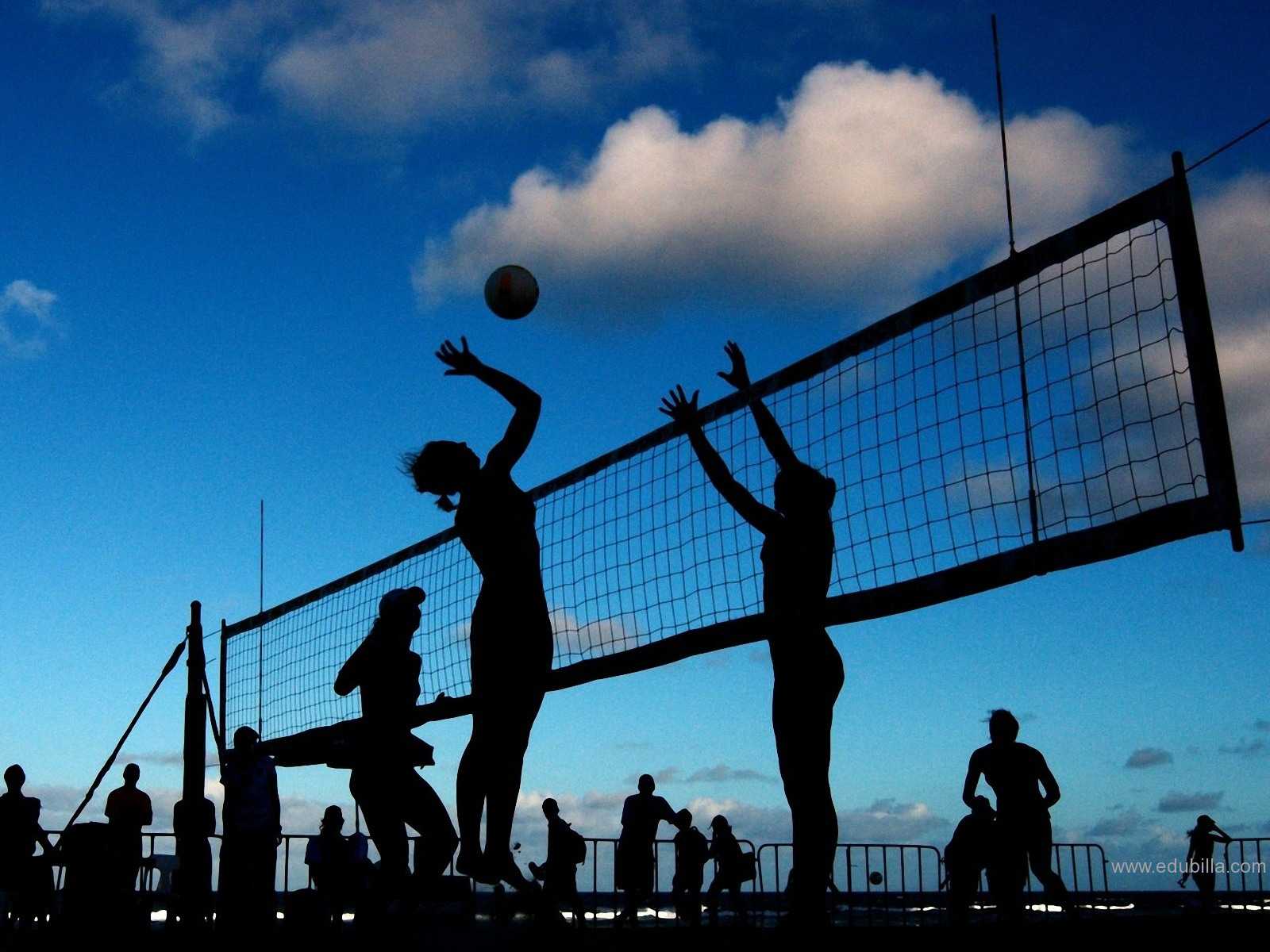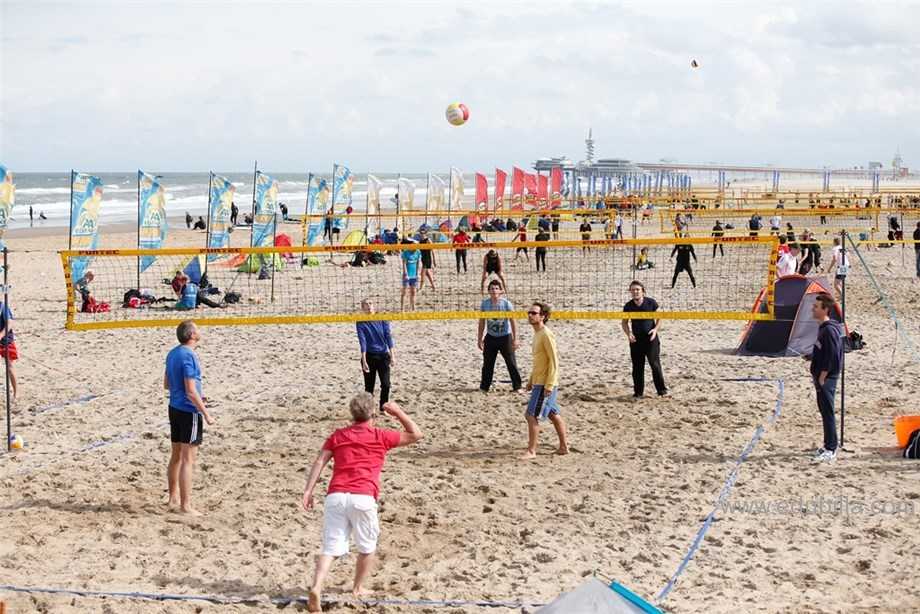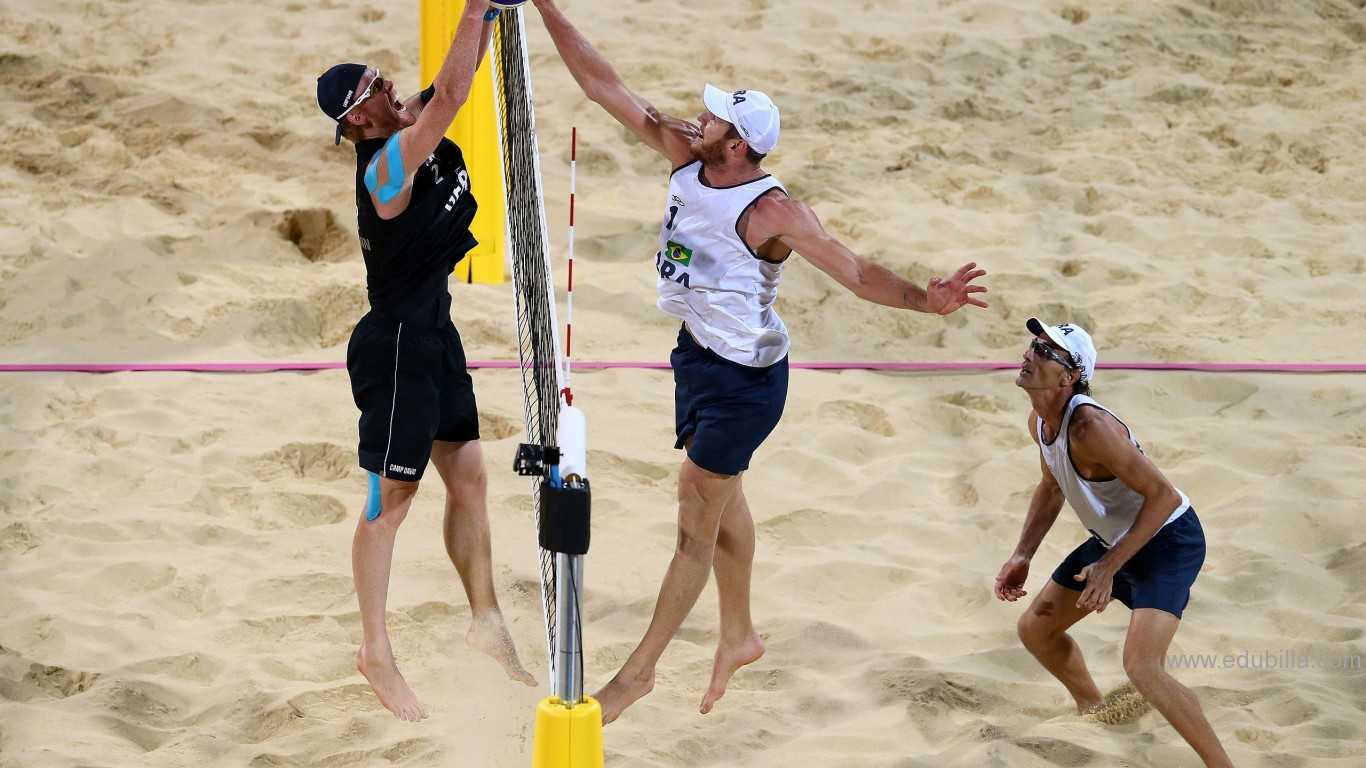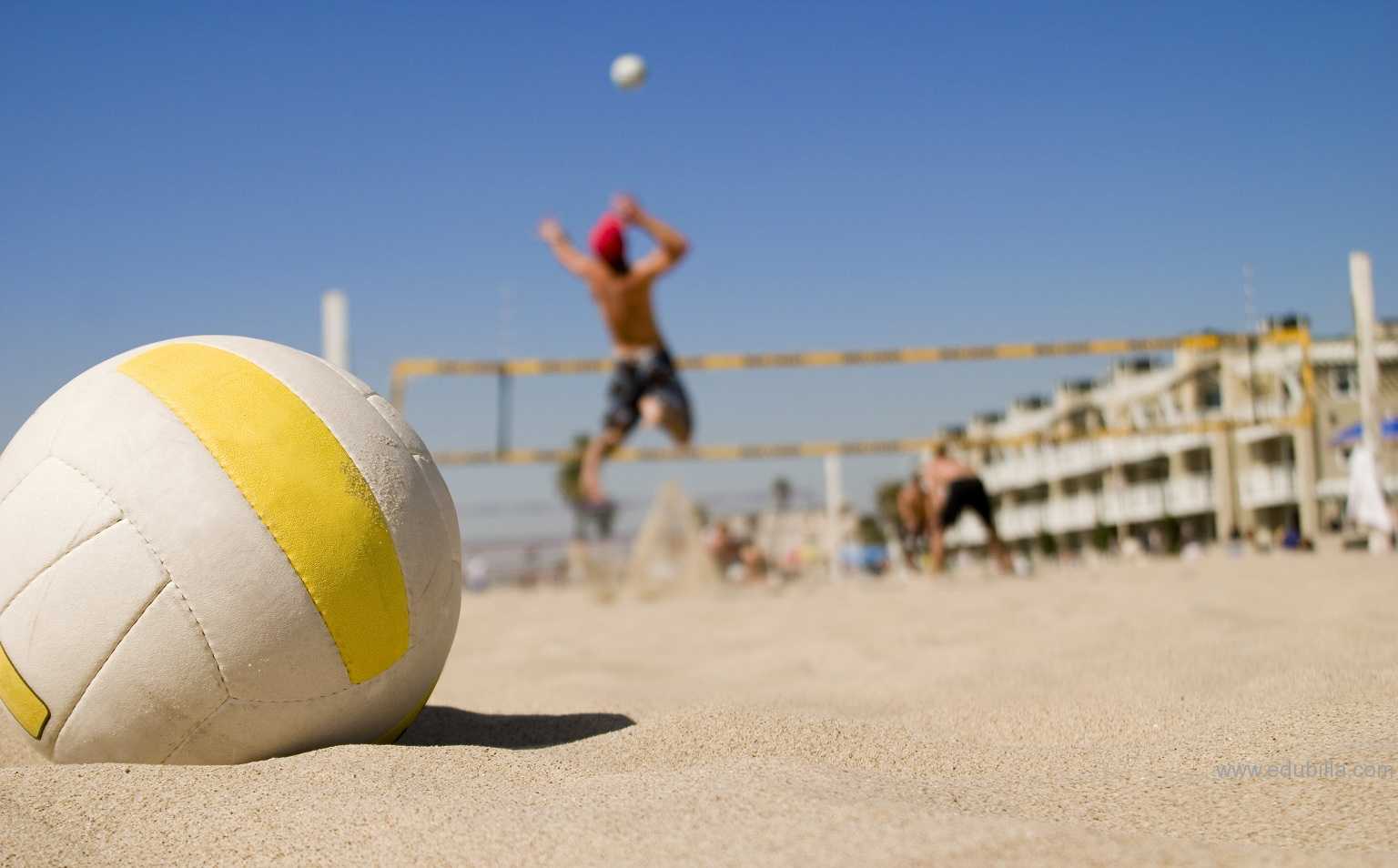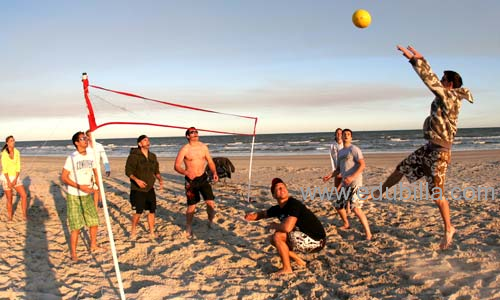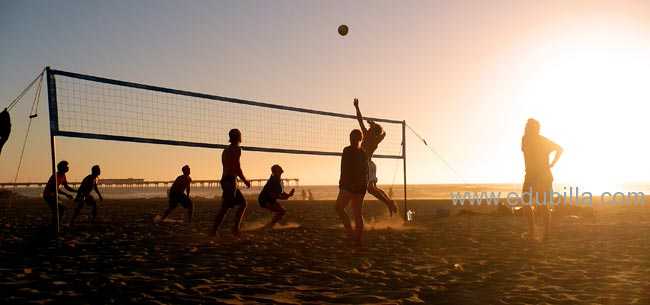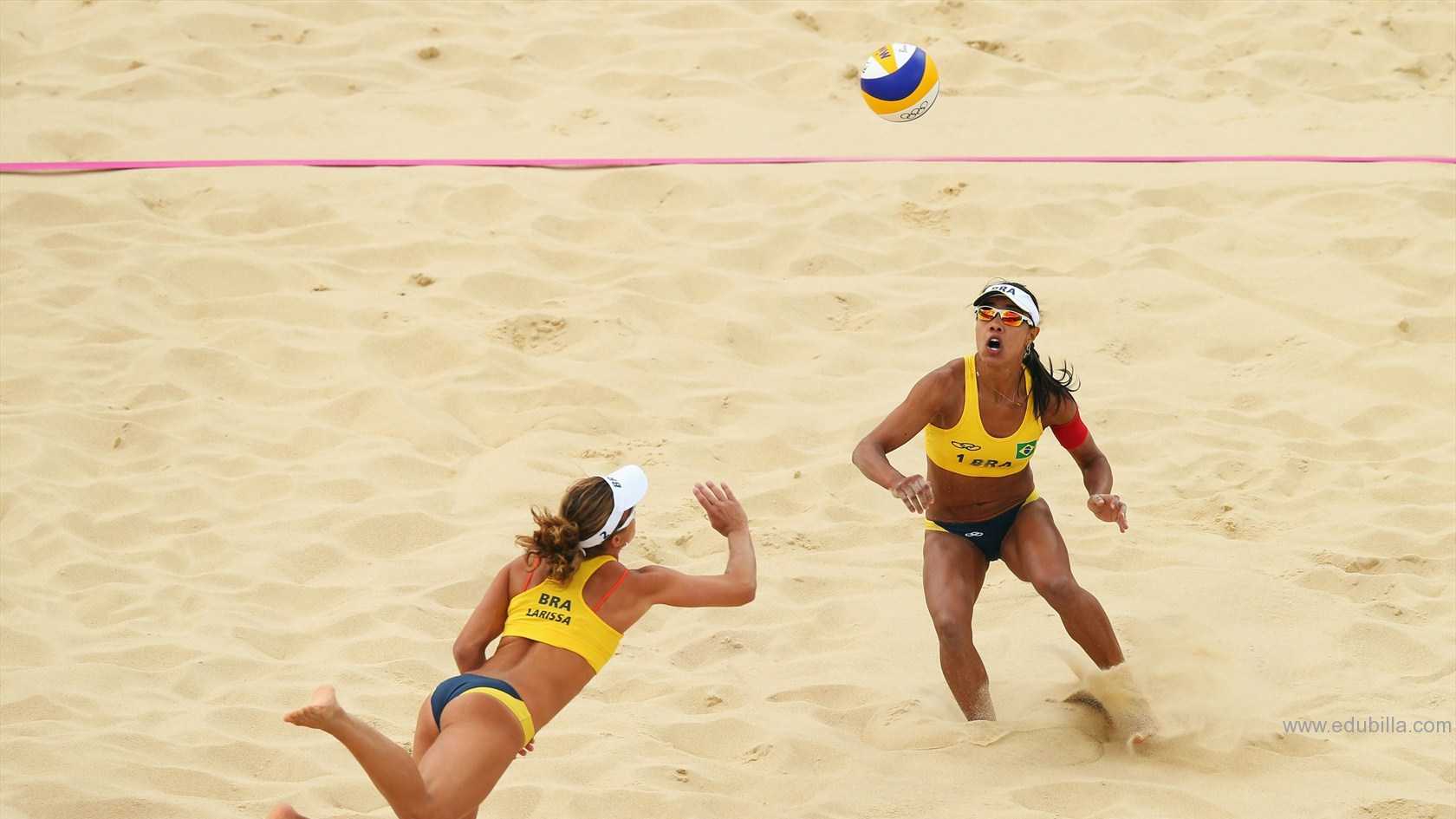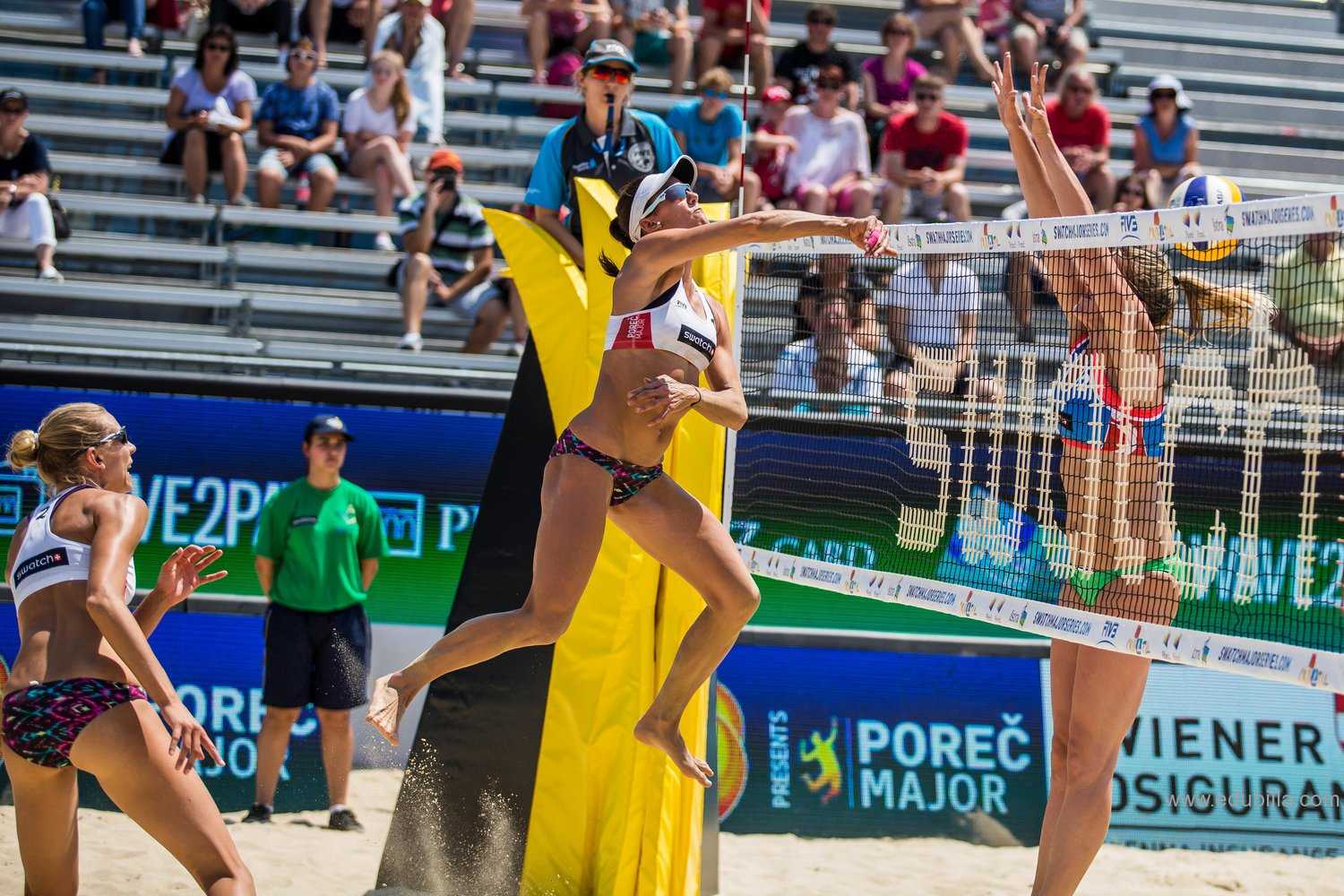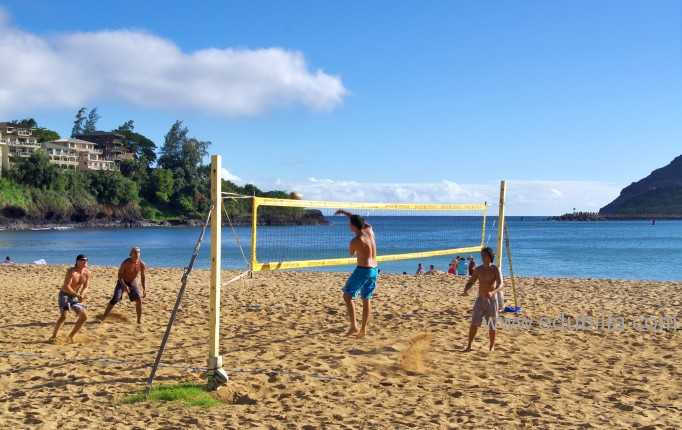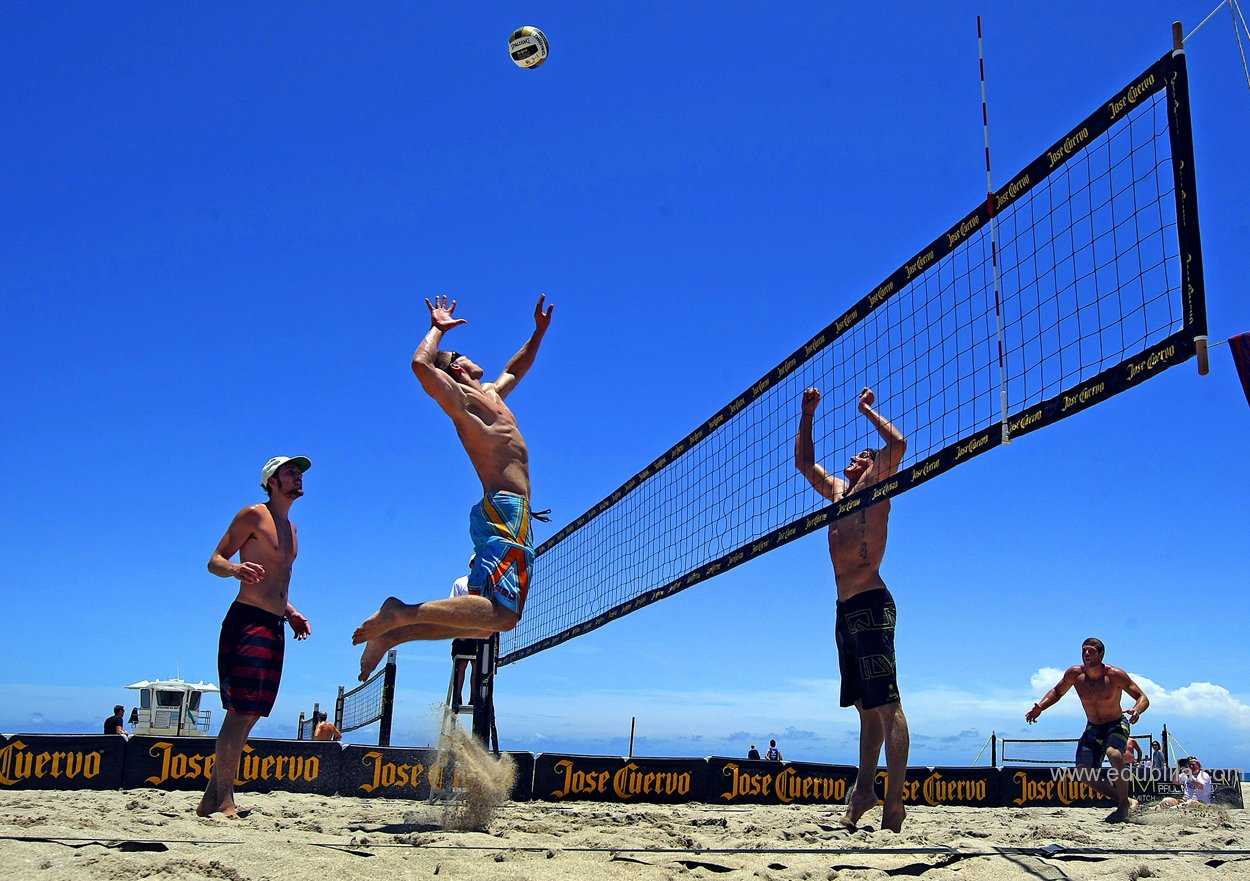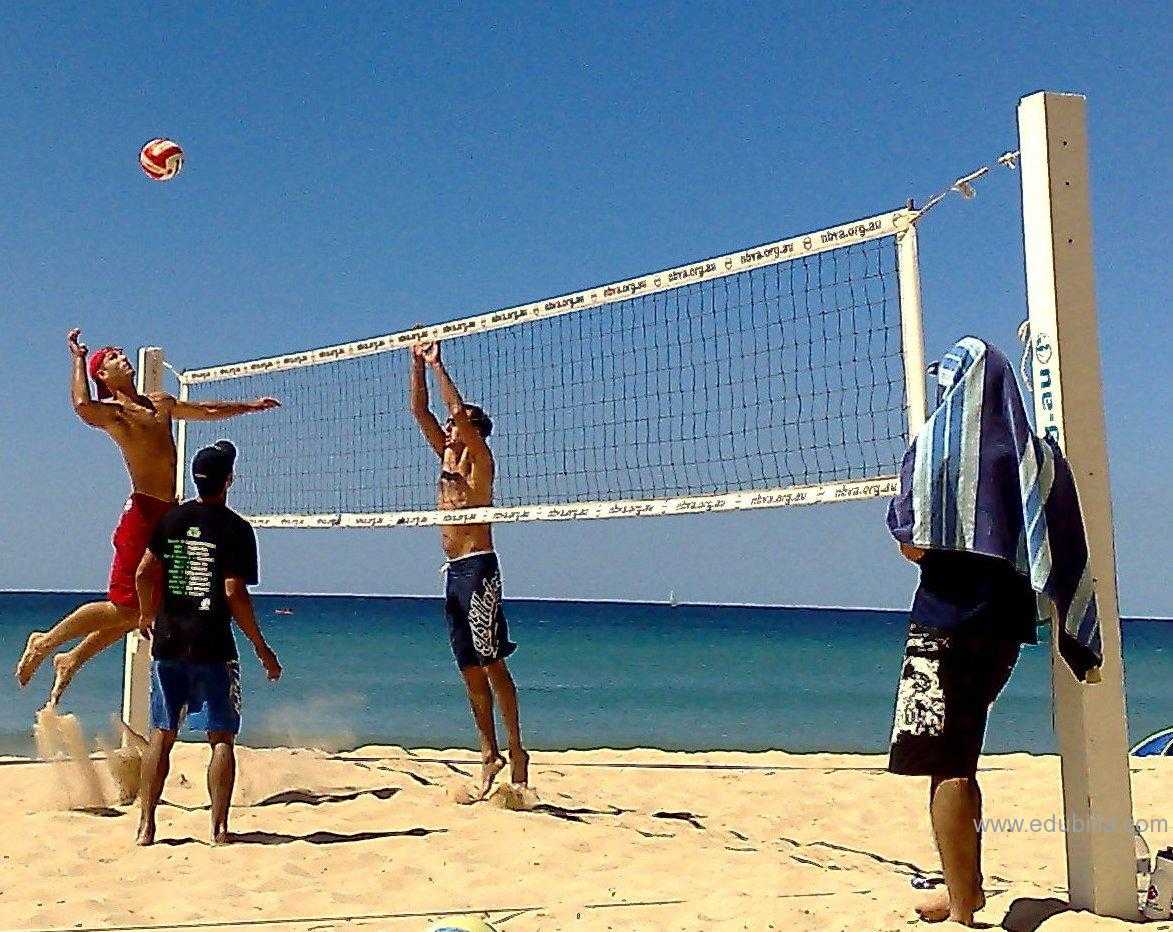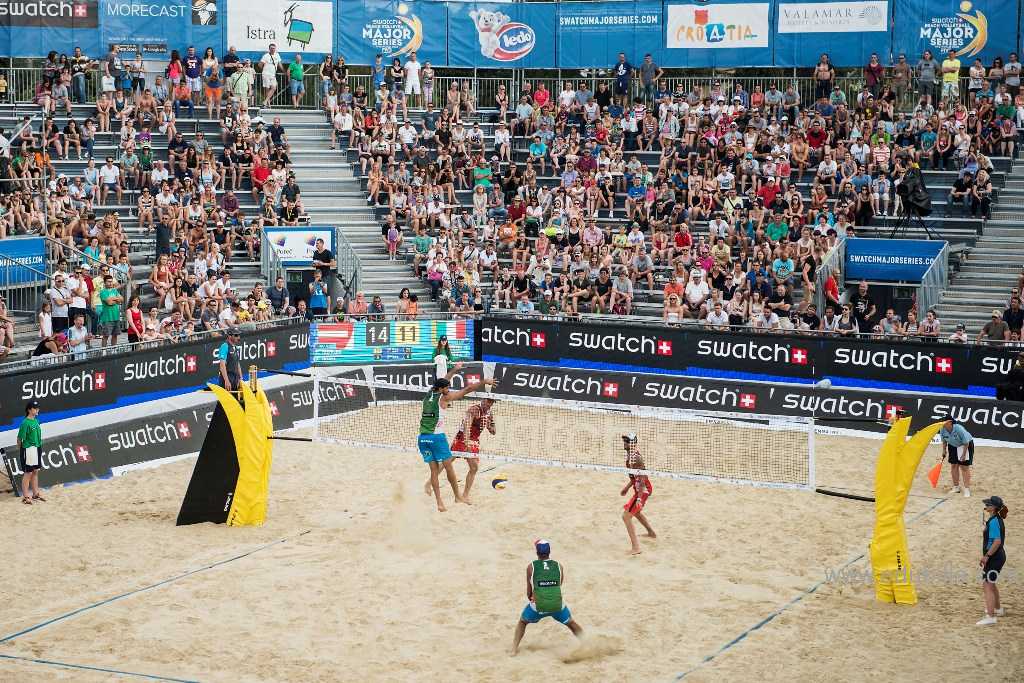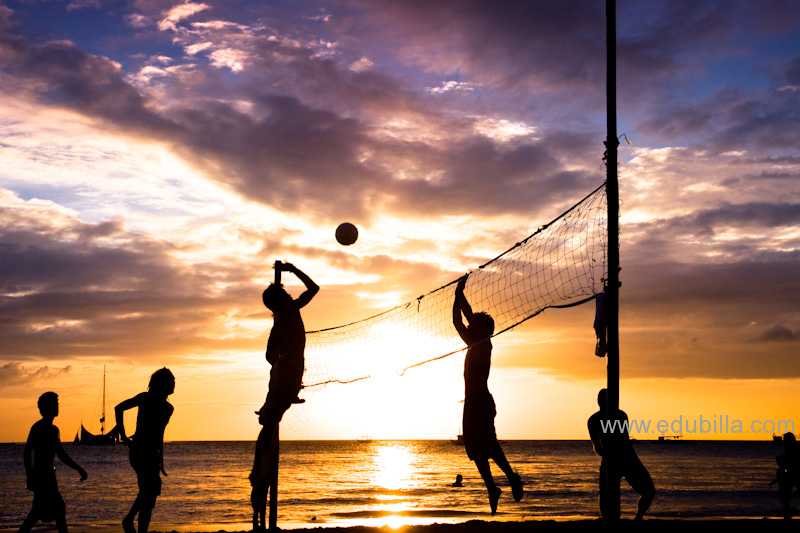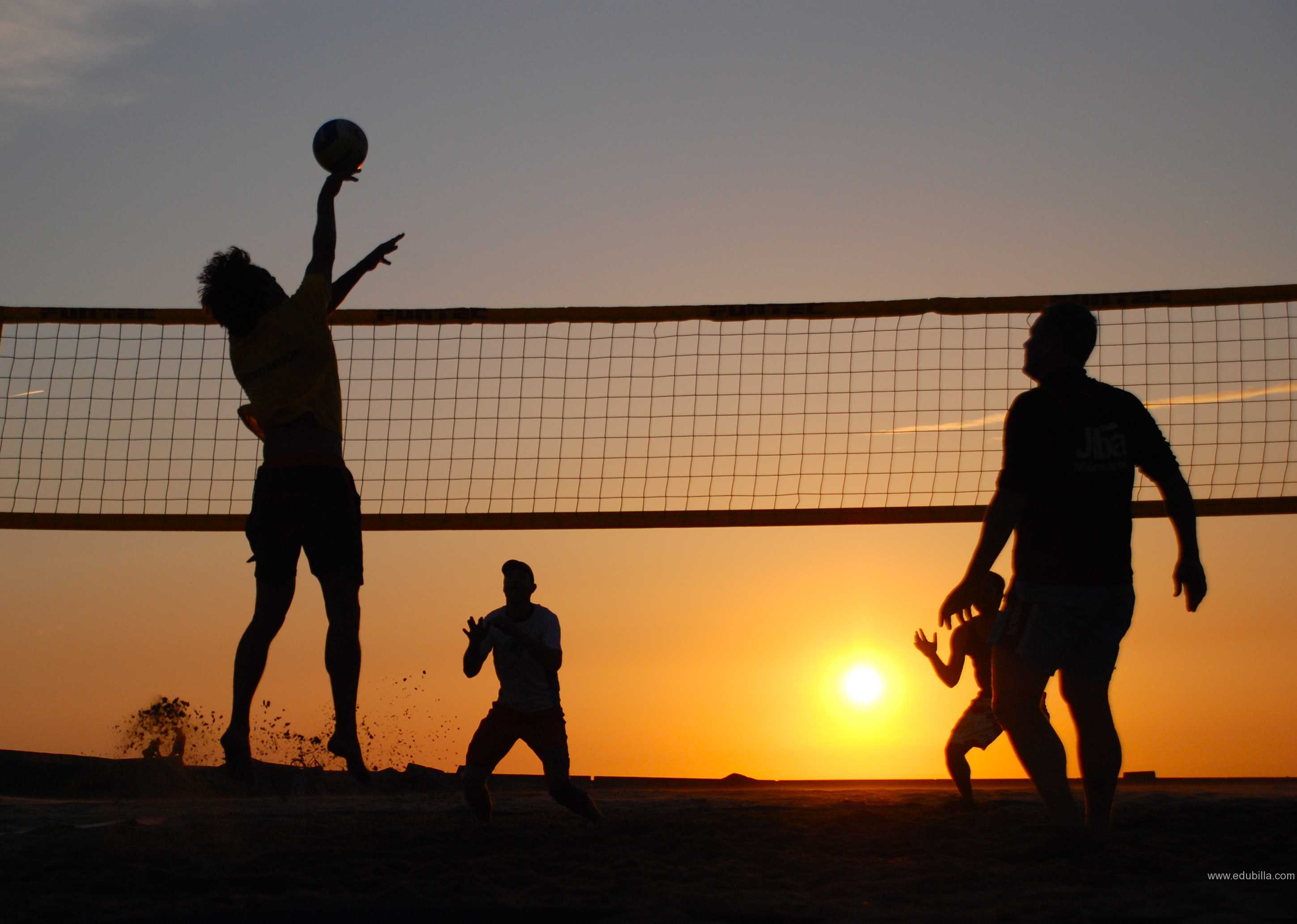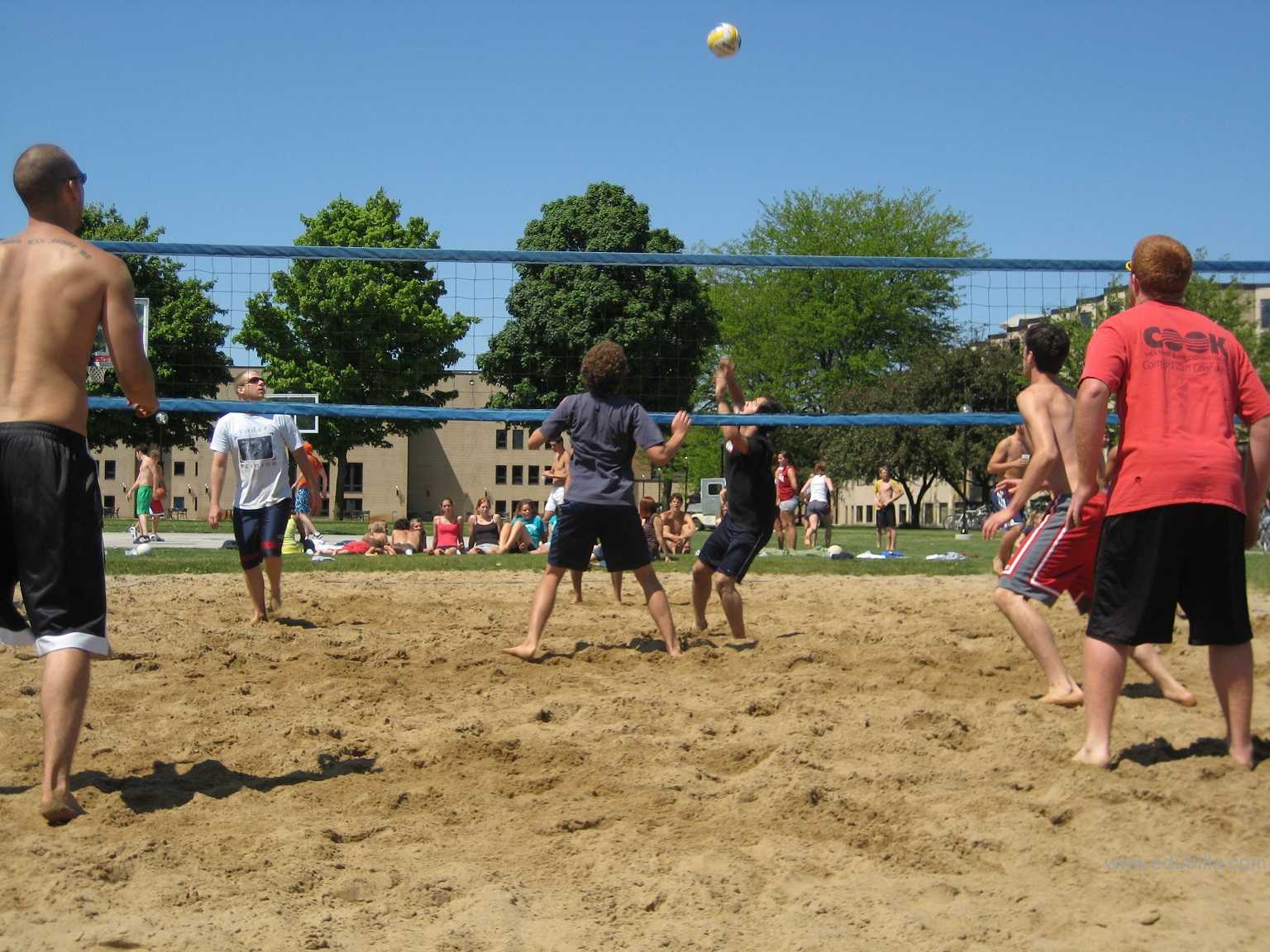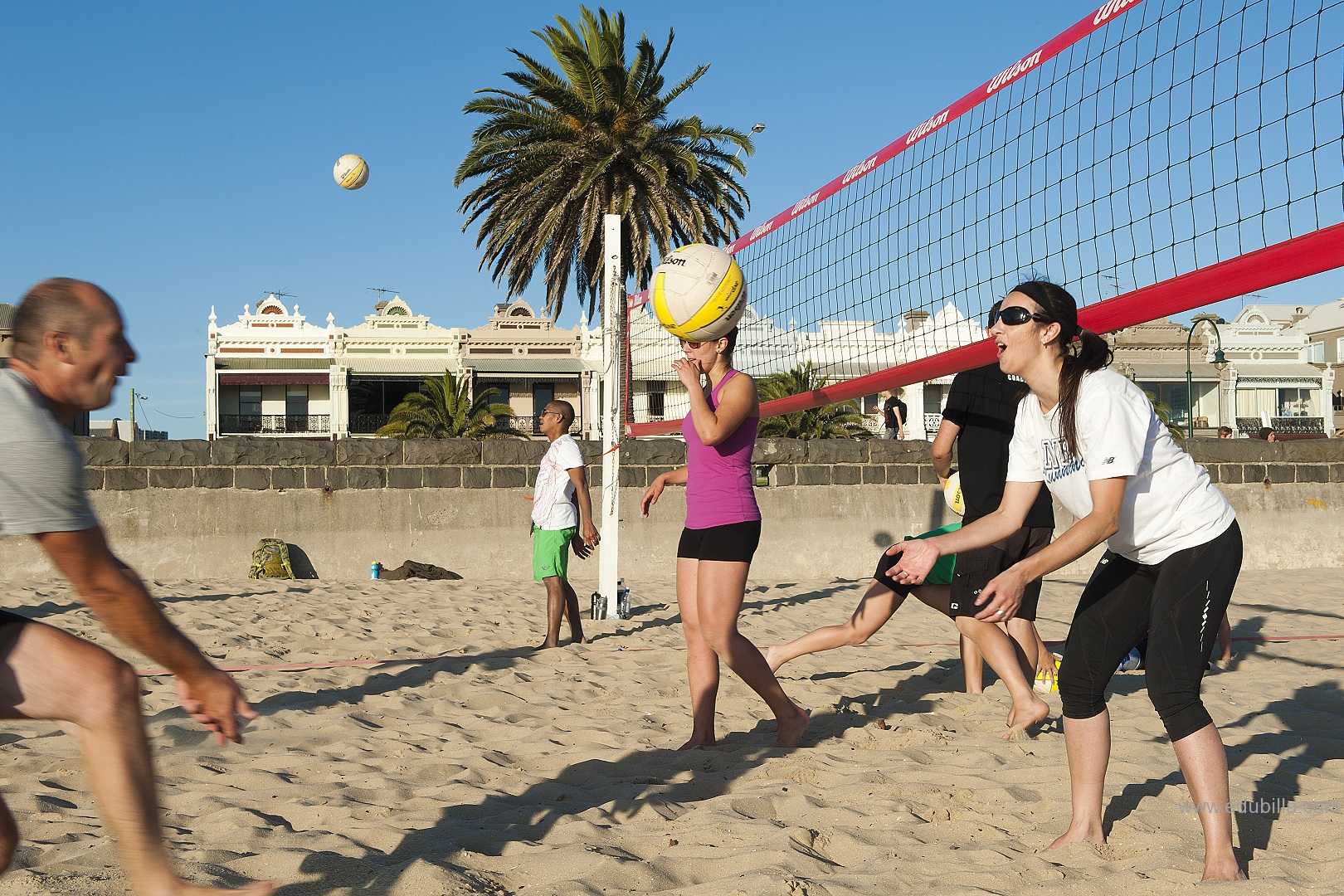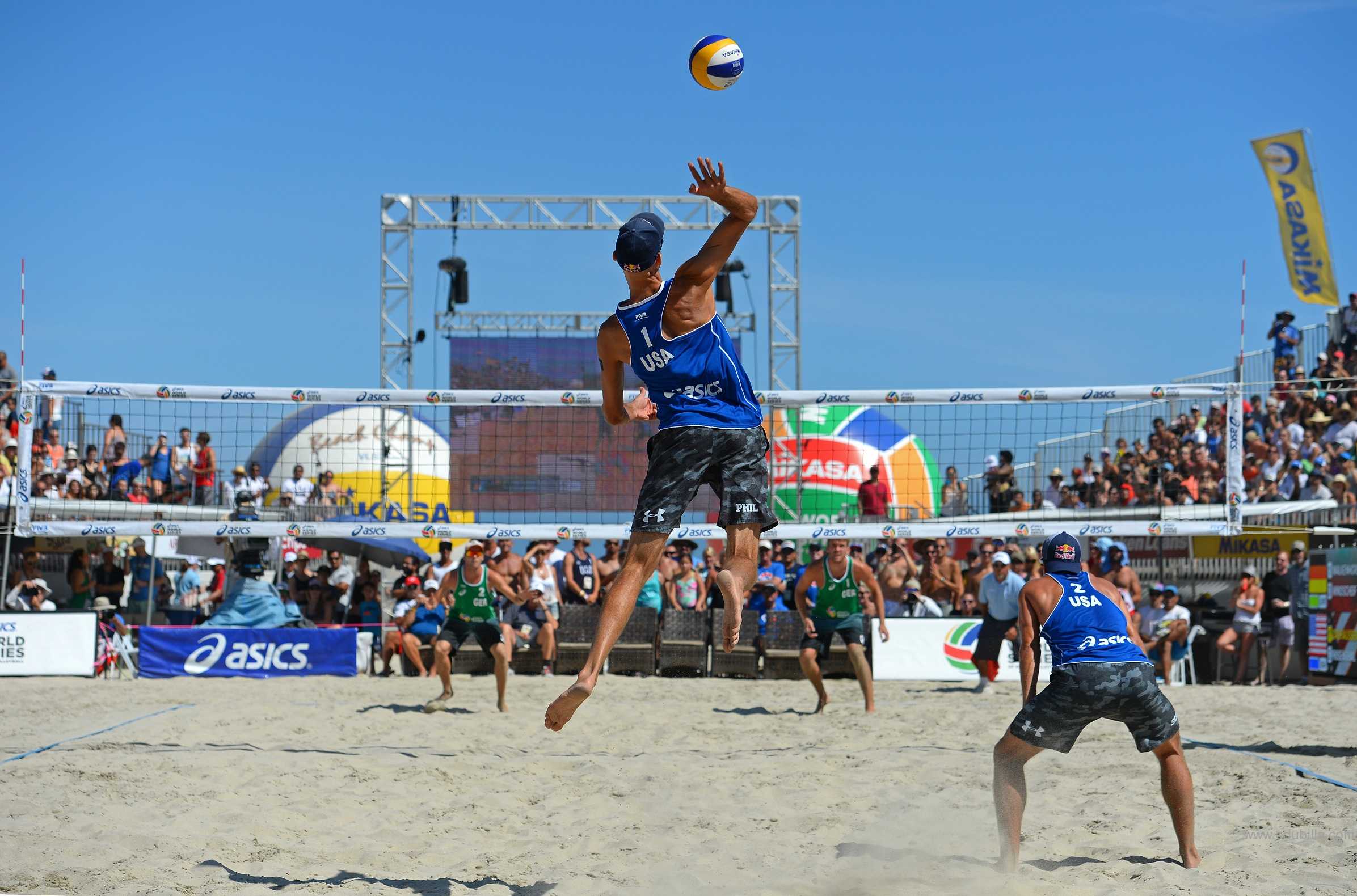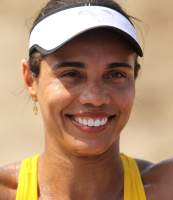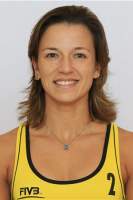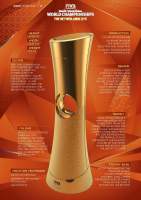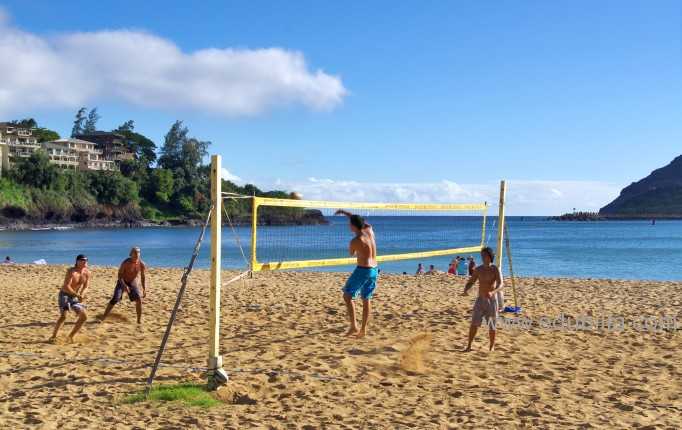
Overview Of Beach volleyball
Beach volleyball is a team sport played by two teams of two players on a sand court divided by a net. It has been an Olympic discipline since the 1996 Games.
Beach volleyball provides intense competition and athleticism in an almost festive atmosphere as both fans and athletes enjoy sun and sand mixed with national pride. In both men’s and women’s tournaments, two-person teams compete on sand courts nearly the same size as the indoor volleyball courts covered by six players a side.
Growth and Development:
The sport quickly became popular across the world. Japan was playing the game by 1896, followed closely by other Asian countries and the sport developed rapidly over the next 20 years. A specially designed ball came into play; six-a-side play became standard and the rules mandating three hits were instituted.
Objective :
Beach Volleyball is one of the world's most popular team sports. The main objective of volleyball is to stop the ball hitting the ground anywhere on your side of the net with just three touches - whilst trying to make it hit the ground on your opponent’s side of the court.
Terminology:
Block
When a player blocks an opposing player by jumping at the net with arms in the air.
Dig
A defensive shot where a player places both arms together when hitting the ball. Often used as a result of a spike from the opposing team.
Spike
To smash the ball into the opponent’s court using an overhead motion.
Game Rules
The Serve
- Server must serve from behind the end line until after contact
- Ball may be served underhand or overhand
- Ball must be clearly visible to opponents before serve
- Served ball may graze the net and drop to theother side for point
- First game serve is determined by a volley, each subsequent game shall be served by the previous game loser
- Serve must be returned by a bump only. no setting or attacking a serve
Scoring
- Rally scoring will be used.
- There will be a point scored on every score of the ball.
- Offense will score on a defense miss or out of bounds hit.
- Defense will score on an offensive miss, out of bounds hit, or serve into the net.
- Game will be played to 25 pts.
- Must win by 2 points.
Rotation
- Team will rotate each time they win the serve
- Players shall rotate in a clockwise manner
- There shall be 4-6 players on each side.
Playing The Game
- Maximum of three hits per side
- Player may not hit the ball twice in succession (A block is not considered a hit)
- Ball may be played off the net during a volley and on serve
- A ball touching a boundary line is good
- A legal hit is contact with the ball by a player body above and including the waist which does not allow the ball to visibly come to a rest
- If two or more players contact the ball simultaneously, it is considered one play and the players involved may not participate in the next play
- A player must not block or attack a serve
- Switching positions will be allowed only between front line players. ( After the serve only )
Basic Rule Violations
- Stepping on or over the line on a serve
- Failure to serve the ball over the net successfully
- Hitting the ball illegally ( Carrying, Palming, Throwing, etc. )
- Touches of the net with any part of the body while the ball is in play. If the ball is driven into the net with such force that it causes the net to contact an opposing player, no foul will be called, and the ball shall continue to be in play
- Reaching over the net, except under these conditions a) When executing a follow-through b) When blocking a ball which is in the opponents court but is being returned ( the blocker must not contact the ball until after the opponent who is attempting to return the ball makes contact). Except to block the third play
- Reaches under the net ( if it interferes with the ball or opposing player )
- Failure to serve in the correct order
- Blocks or spikes from a position which is clearly not behind the 10-foot line while in a back row position
The Court
- Both indoor and outdoor courts are 18 m x 9m
- Indoor courts also include an attack area designated bya line 3 m back from the center line
Net Height
- Net height for men, co-ed mixed 6 is 2.43 meters
- Net height for women is 2.24 m
Equipments Need For Beach volleyball
- Ball
- Net
- Shoes
History Of Beach volleyball
Volleyball was conceived as a less strenuous alternative to basketball. The sport became popular very quickly and made its Olympic debut in 1964.Basketball and volleyball were both invented at Springfield College in Massachusetts within a few years of one another. In 1895, William G. Morgan, after watching basketball develop, decided to invent a less strenuous sport for older people. He called this game "Mintonette". However, a local professor noted the ball being volleyed over the net, and the sport was almost immediately renamed.
The History of Beach volleyball at a Glance:
- 1895 William G. Morgan, an instructor at the Young Men's Christian Association (YMCA) in Holyoke, Mass., decides to blend elements of basketball, baseball, tennis, and handball to create a game for his classes of businessmen which would demand less physical contact than basketball. He creates the game of Volleyball (at that time called mintonette). Morgan borrows the net from tennis, and raises it 6 feet 6 inches above the floor, just above the average man's head.
- 1920s There are unconfirmed whispers of men’s teams playing on the beach in Hawaii, but most accounts place the sport's origin in Santa Monica, California where the first Volleyball courts are put up on the beach at the Playground. Families play 6 vs. 6.
- 1927 Beach Volleyball crosses the Atlantic Ocean. It becomes the principal sport in a French nudist camp founded in Franconville, a north-western suburb of Paris.
- 1930s The first two-man beach volleyball game is played in Santa Monica, California.
- 1930s Beach volleyball appears in Palavas, Lacanau and Royan (France), around Sofia (Bulgaria), Prague (Czechoslavakia), and Riga (Latvia).
- 1930s In the US, people escape the depression by going to the beach; 4 vs 4 and 3 vs 3 games are played.
- 1947 The first official two-man Beach Volleyball tournament is held at Will Rogers State Beach, California with no prize money. It is organized by Bernie Holtzman and won by Manny Saenz and Harris.
- 1948 The first tournament to offer a prize is held in Los Angeles, California. It awards the best teams with a case of Pepsi.
- 1950s The first circuit is organized by the Parks & Recreation Departments on five beaches in California: Santa Barbara, Will Rogers State Beach, Sorrento Beach, Laguna Beach, and San Diego. In the database, this era is referred to as Parks & Recreation (P&R).
- 1950s In Brazil, the first tournament sponsored by a newspaper publishing company takes place.
- 1950s The beginning of "Beachmania": Beach Volleyball becomes an entertainment show with Beauty Contests included in the official program.
- 1957 Bernie Holtzman and Gene Selznick win an event that features Greta Tyson, star of "Pajama Tops", as Queen of the Beach. Beach volleyball becomes more than a sport; it turns into a real show.
- 1960s In France, the winners of 3 vs. 3 games earn about 30,000 French Francs in tournaments in La Baule and les Sables d'Olonne.
- 1960s Open tournaments are held on thirteen beaches in California: Santa Cruz, Santa Barbara, Will Rogers State Beach, Manhattan Beach, Corona del Mar, Laguna Beach, San Diego, Mission Beach, Newport Beach, Rosecrans, Sorrento Beach, Marine Street, and Laguna Niguel. The first Manhattan Beach Open takes place in 1960.
- 1960s President Kennedy attends the first official Beach Volleyball event in Sorrento Beach, Los Angeles.
- 1965 The California Beach Volleyball Association (CBVA) is founded. Tournament organizers meet to coordinate schedules and define the rules of the game.
- 1970 The first Hermosa Beach tournament is played with Ron Von Hagen and Henry Bergman capturing the title.
- 1975 Winston Cigarettes becomes the first commercial company to sponsor a tournament which takes place in San Diego, California with 250 spectators. A total of $1,500 in prize money is offered with Dennis Hare and Fred Zeulich winning the event.
- 1976 Olympia Beer presents the Inaugural Professional Championships of Beach Volleyball at Will Rogers State Beach with a $5,000 first prize. The event is won by Jim Menges and Greg Lee. It is estimated that close to 30,000 spectators enjoy the competition.
- 1976 Events Concepts is founded to promote and expand the beach tour.
- 1976 The first event played outside of California takes place on the shores of Lake Tahoe, Nevada. Fred Sturm and Gary Hooper take home 1st place.
- 1976 Ron Von Hagen retires with record 62 Open Wins. Von Hagen is now considered the Babe Ruth of Beach Volleyball.
- 1978 Jose Cuervo Tequila enters as the sport's first major sponsor.
- 1979 Prize money for the major US events doubles to $10,000.
- 1979 The King of the Beach tournament in Manhattan Beach offers $11,000 prize money.
- 1979 Tournaments are held in four states, California, Hawaii, Colorado, and Nevada.
- 1980 The first sponsored tour in the US begins with seven events on the calendar and $52,000 prize money. The tour includes stops in San Diego, Santa Barbara, Laguna Beach ($5,000), Manhattan Beach ($10,000), The King of the Beach ($12,000), and The World Championships ($15,000).
- 1981 Miller Brewing Company joins Beach Volleyball as a major sponsor.
- 1982 The tour becomes national with the first east coast tournament held in Clearwater, Florida. With Miller Brewing as a sponsor, $69,000 in total cash prizes are awarded for six tournaments.
- 1982 Beach Volleyball becomes popular on the beaches of Copacabana and Ipanema in Rio de Janeiro, Brazil.
- 1983 $137,000 in total cash prizes are awarded for twelve tournaments. The tour expands with stops in New York, and Chicago.
- 1983 On July 21, the Association of Volleyball Professionals (AVP) is formed to protect players' interests and to preserve the integrity of beach volleyball.
- 1984 Players strike at the World Championships in Redondo Beach. The AVP begins running its own tour.
- 1985 Bolle Sunglasses joins the AVP as a major sponsor. The total tour prize money reaches $275,000.
- 1985 The AVP Tour includes stops in eight states ( California, Florida, Colorado, Illinois, New Jersey, Massachusetts, Arizona, and Hawaii).
- 1986 The first international Beach Volleyball exhibition in Rio de Janeiro is held with 5,000 spectators.
- 1986 Brazilian Volleyball Champions, like Renan, Badá, Montanaro, William, Jackie Silva, Isabel Salgado, Vera Mossa, Regina Uchoa, along with the 1984 Olympic Volleyball Champion, Pat Powers and the King of the Beach, Sinjin Smith become leading figures in the world-wide growth of Beach Volleyball.
- 1986 The Australian Pro Beach Circuit is born.
- 1986 AVP Pro Beach Volleyball receives cable television coverage via "Prime Ticket", and Pro Beach Volleyball makes its network debut on ABC's Wide World of Sports.
- 1986 The Women's Professional Volleyball Association (WPVA) is created when a group of professional women that include former Olympic and collegiate All-American volleyball players join together. Led by Pepperdine volleyball coach Nina Matthies, the formation of the WPVA is the first step to organizing the women's pro beach volleyball events which had previously been played as amateur games or as the accompaniment to the men's professional game.
- 1987 The first international FIVB sanctioned Beach Volleyball tournament is held at Ipanema Beach ( Rio de Janeiro, Brazil) with $22,000 in prize money. Sinjin Smith and Randy Stoklos win the tournament.
- 1987 The WPVA holds its first Women's Professional event in Newport Beach, California on May 16-17. Linda Chisholm and Jackie Silva win the event and split $300 in prize money. Chisholm dominates the inaugural season winning eight out of nine tournaments with two different partners, Jackie Silva (seven) and Nina Matthies (one).
- 1988 The AVP awards cash prizes for twenty-seven tournaments. The AVP signs a three-year contract with Miller that results in a total of $4.5 million in prize money. Miller hires the AVP to produce twenty-three Lite Beer events.
- 1989 After winning two indoor Olympic gold medals with USA volleyball and playing indoors professionally in Italy, Karch Kiraly turns to the beach full time and wins four events with Brent Frohoff.
- 1990 The first FIVB Beach Volleyball International Circuit offering $140,000 in total prize money, named the World Series, is created with men’s tournaments in Brazil, Italy, and Japan. The Brazillian event sells out with thousands of people outside the stadium wanting to get in. Sinjin Smith and Randy Stoklos are the Men's World Champions.
- 1990 NBC Sports makes its debut on the beach volleyball scene, broadcasting the Hermosa Beach event.
- 1990 In the AVP, Sinjin Smith and Randy Stoklos top the $200,000 mark in a single season, each winning $221,438. Karch Kiraly teams up with a young Kent Steffes to win two events out of ten before returning to win five of thirteen with Brent Frohoff.
- 1991 The AVP adds the King of the Beach Event to their schedule. This event features a unique format where players play round-robin with different partners to determine the "King of the Beach." One of the event's creators, Karch Kiraly, wins the inaugural title.
- 1991 NBC Sports provides the first live coverage of an AVP tournament in Milwaukee.
- 1991 The FIVB Beach Volleyball World Series stops in four countries (France, Italy, Japan and Brazil) and offers $200,000 in total prize money. The 1990/91 Men World Champions are once again Sinjin Smith and Randy Stoklos.
- 1994 Brazil, United States, and Chile host Women's FIVB Beach Volleyball events.
- 1994 The Men's World Champions are Jan Kvalheim and Bjorn Maaseide (Norway) and the Women's World Champions are Mônica Rodrigues and Adriana Samuel (Brazil).
- 1995 The season's biggest news is the injury to Kent Steffes that forces Karch Kiraly to find another partner. Karch chooses Scott Ayakatubby until Steffes' return. After reuninting with Kent, the two only manage one win in four events, and Karch again turns to Ayakatubby. The season proves to be a gold mine for Scott who wins eight times with Karch in just thirteen events compared to seven prior victories in thirteen seasons.
- 1995 The Miller Lite/AVP Tour grows to a record twenty-nine tournaments. The Evian Indoor Series becomes a full pre-season circuit, with events in Washington, DC, Boston, Minneapolis and New York.
- 1995 In the WPVA, Holly McPeak and Nancy Reno return from the AVP, who's women's tour folds, to end Karolyn Kirby's and Liz Masakayan's dominance. McPeak and Reno win eight of fourteen tournaments together when Liz Masakayan is sidelined with an injury that shortens her season. Liz and Karolyn play just seven events together, winning three.
- 1995 The FIVB Beach Volleyball World Championship Series includes twenty-seven tournaments for both men and women and offers $3.5 million in total prize money.
- 1995 Host Broadcasters present 100 hours of news, highlights and broadcasting of FIVB events.
- 1995 The FIVB Final Beach Volleyball Rankings serve as a basis to qualify the best pairs in the world for the Olympics. Some 600 athletes representing 42 countries take part in the Olympic Qualification season.
- 1995 Over 50 National Federations have set up a Beach Volleyball National Council to promote the sport in their countries.
- 1995 Brazilian teams sweep the World Championships as Franco Neto and Roberto Lopes are the Men's Champions setting a record with seven victories for the season. Jackie Silva and Sandra Pires are the Women's Champions despite a stellar performance from Nancy Reno who sets the record with seven victories, six coming with Holly McPeak and the other with Karolyn Kirby.
- 1996 Karch Kiraly claims his fourth King of the Beach title at the Hard Rock Hotel and Casino in Las Vegas.
- 1996 AVP teams dominate the U.S. Olympic Trials in Baltimore with the teams of Karch Kiraly/Kent Steffes and Mike Dodd/ Mike Whitmarsh advancing as the U.S. Olympic Team representatives.
- 1996 Karch Kiraly and Kent Steffes cap off their incredible year with wins at Manhattan Beach, Hermosa Beach and the Great Texas Shootout, where they take home the winner-take-all payout of $100,000. Steffes is voted by his peers as Miller Lite/AVP Tour Player of the Year. Kiraly breaks the single season prize money earnings record with $492,081. Despite having such a great season, Adam Johnson and Jose Loiola end their dominance and become threats on the tour winning seven tournaments, including four in a row, while limiting Karch and Kent to just eleven victories.
- 1996 The FIVB Beach Volleyball World Championships Series once again holds twenty-nine tournaments for both men and women for a record $4.3 million in total prize money.
- 1996 The first Olympic Beach Volleyball competition takes place from July 23 to 28 in Atlanta Beach, in a 10,000-seat stadium. Twenty-four men’s teams and eighteen women’s teams compete for Olympic medals as over 107,000 spectators attend the event. American teams dominate the men's competition with a gold and silver medal sweep. Karch Kiraly and Kent Steffes take home the gold as Kiraly becomes a three-time gold medalist and the first indoor and outdoor Olympic champion in volleyball. Mike Dodd and Mike Whitmarsh win the silver medal. Canadians John Child and Mark Heese outduel Portugal's Joao Brenha and Miguel Maia for the bronze medal. In the women's competition, Brazil dominates with Jackie Silva and Sandra Pires beating fellow Brazilians Mônica Rodrigues and Adriana Samuel for the gold medal. Australians Natalie Cook and Kerri-Ann Pottharst win the bronze.
- 1996 In November the IOC confirms that Beach Volleyball will be included in the 2000 Olympic Games in Sydney.
- 1996 The number of National Federations which have regular Beach Volleyball activities soars to 95.
- 1996 Brazilians once again dominate the World Championships with Zé Marco and Emanuel Rego winning the Men's Championships and Jackie Silva and Sandra Pires winning the Women's Championships. Rego sets the men's FIVB record for winnings in a season with $174,000, and Silva and Pires tie the women's FIVB record for victories in a season with seven.
- 1997 Jose Loiola wins the Miller Lite King of the Beach Invitational after finishing as runner-up for the past three years. Loiola joins Karch Kiraly and Adam Johnson among an elite group of "Kings."
- 1997 The 38th annual Manhattan Beach Open is canceled due to legal issues and a lawsuit brought against the City of Manhattan Beach, Los Angeles County, and the AVP by a small local interest group. The event is moved down the coast to Hermosa Beach and renamed the Miller Lite Hermosa Beach Grand Slam.
- 1997 Dain Blanton becomes the first African-American professional beach volleyball player to win a tournament on the Miller Lite/AVP Tour, with partner Canyon Ceman at the Miller Lite Hermosa Beach Grand Slam. This event also marks the most prize money for a single tournament in the history of beach volleyball at $300,000.
- 1997 Jose Loiola becomes the first international player to reach the $1 million mark in career earnings as he and partner Kent Steffes win the Miller Lite Open at Chicago, one of twelve tournament wins for the pair in 1997. Kent claims his 100th career win, teaming with Jose at the Miller Lite Open at Milwaukee.
- 1997 Karch Kiraly and new partner Adam Johnson go winless until the end of July and then win four consecutive tournaments. At the Miller Lite U.S. Championships at Hermosa Beach they defeat the rookie tandem of Dax Holdren and Todd Rogers. With their second place finish, Holdren and Rogers set a Miller Lite/AVP Tour record for the best finish by a rookie team.
- 1997 The AVP business collapses under mounting financial problems. AVP CEO Jerry Solomon is fired and Harry Usher, former US Olympic organizer is hired to run 1998 AVP Tour.
- 1997 Holly McPeak and Lisa Arce dominate what will be the final WPVA season winning seven of twelve events.
- 1997 Brazilians dominate the Tour Championships for the third straight year as Zé Marco and Emanuel Rego repeat as the Men's Champions and Adriana Behar and Shelda Bede win the Women's Championships.
- 1998 Prize money is drastically cut as sponsors pull back on their support of the AVP. The AVP continues to struggle under extreme financial burden.
- 1998 Eric Fonoimoana is crowned King of the Beach at the Hard Rock Hotel and Casino in Las Vegas.
- 1998 Emanuel Rego, the world's #1 ranked player signs with the AVP and teams with Jose Loiola to create one of the tour's most exciting teams. Emanuel earned AVP Rookie of the Year for his outstanding play, winning four tournaments, two with Loiola, one with fellow Brazilian Andre Gomes, and one with Kent Steffes.
- 1998 The first all Brazillian final is played in Cleveland. Jose Loiola and Emanuel Rego defeat Franco Neto and Roberto Lopes.
- 1998 Bill Berger and Dan Vrebalovich take over management of the AVP as CEO and COO respectively. They immediately fund the day to day business, and begin to restructure the AVP from a players association to a for-profit, privately owned entity. The AVP is placed into chapter 11 bankruptcy, the players are signed to new long-term agreements as independent contractors and a long-term turnaround deal is agreed to by the AVP's creditors.
- 1998 For the first time in the FIVB World Tour, men and women players are rewarded at the same level with $170,000 in total prize money per Open event.
- 1998 In March the Olympic qualification formula and the competition program for the Olympic Beach Volleyball tournament are established. National Federations and teams receive information almost three years before the Olympics. Twenty-four men's teams and an equal number of women's teams, will compete in the 2000 Olympic Games in Sydney (Bondi Beach).
- 1998 A massive TV campaign orchestrated by the FIVB Marketing Department and Television Agency, will give tremendous exposure to the World Tour.
- 1998 The 1998 Goodwill Games feature Beach Volleyball competitions from July 22 to August 2 in New York’s Central Park with the world’s eight best men's and women's teams. The men's medallists are, gold: Rogerio Pará and Guilherme Marques (Brazil), silver: Karch Kiraly and Adam Johnson (United States), and bronze: Martin Conde and Eduardo Martinez (Argentina). The women's medallists are, gold: Adriana Behar and Shelda Bede (Brazil), silver: Pauline Manser and Kerri-Ann Pottharst (Australia), and bronze: Holly McPeak and Lisa Arce (United States).
- 1998 Beach Volleyball is included in major sports competitions such as the South East Asian Games, Central and Pan-American Games, Universiade, etc.
- 1998 The FIVB offers new opportunities to mid-level players and organizers by introducing Challenger, Satellite, and Amateur tournaments, in addition to the major World Tour Grand Slam and Open events.
- 1998 More than 120 National Federations now have regular Beach Volleyball activities.
- 1999 Berger and Vrebalovich form a partnership with Spencer Trask Securities to form Major League Volleyball. MLV purchases the AVP out of bankruptcy and funds the 1999 Tour. The AVP holds twelve events with a total of $1 million prize money.
- 1999 Karch Kiraly wins his 139th career open victory at the Sunkist/AVP Dallas Open with partner Adam Johnson and ties Sinjin Smith's all-time record for open victories. A few weeks later on the 4th of July, Kiraly breaks the record as he and partner Adam Johnson win the U.S. Open of Beach Volleyball in Chicago.
- 1999 David Swatik wins the his first event in Hermosa Beach with partner Mike Whitmarsh beating world's #1 ranked team of Jose Loiola and Emanuel Rego. These teams meet again in the finals of the coveted Manhattan Beach Open and again Swatik/Whitmarsh prevail. Swatik goes on to cap a dream season by winning the King of the Beach tournament in Las Vegas.
- 1999 The AVP once again sanctions women's events at five men's tournament tour stops. At the season ending event, combined with the King of the Beach, Holly McPeak is crowned Queen of the Beach.
- 1999 On April 29, continuing on a commitment to increase awareness of its all-new product line-up in the highly competitive California market, Oldsmobile Division of General Motors announces sponsorship of the U.S. Olympic beach volleyball series to determine which athletes will represent America at the 2000 Olympic Games in Sydney, Australia. Three women's and two men's tournaments are played as part of the Oldsmobile Alero Beach Volleyball Series sanctioned by USA Volleyball and the U.S. Olympic Committee.
- 1999 The Olympic qualification process starts with a period from January 1st 1999 until August 15th 2000. The best eight teams results will count towards the qualification of the best twenty-four men and twenty-four women's pairs at the 2000 Olympic Games in Sydney.
- 1999 The Men's and Women's World Championships are organized in Europe for the first time. From July 21st to the 25th, Marseille, France hosts these major competitions with the best athletes of the planet. This event, which is organized every two years and has $600,000 in total prize money, is held in a special facility for 5000 spectators. At the end of the competition the spectators total nearly 50,000. The ranking points are double of any other Open event.
- 1999 At the end of July, Beach Volleyball is included for the first time in the Pan American Games which are held in Canada. In a packed stadium of 5000 spectators, the men's Canadian team of Jody Holden and Conrad Leinemann win against the Brazilain duo of Lula and Adriano. Adriana Behar and Shelda Bede of Brazil win the women's competition.
- 1999 Brazilians dominate the World Championships again with Men's Champions Jose Loiola and Emanuel Rego and Adriana Behar and Shelda Bede repeating as Women's Champions. Loiola and Rego tie the men's FIVB season record with seven victories and Behar and Bede set the women's FIVB record for earnings in a season with each winning $118,000.
- 2000 On January 12, the newly formed professional women's beach volleyball tour titled Beach Volleyball America (BVA) announces the schedule and purses for their inaugural 2000 season of play. The BVA is created to guide and promote the growth of women's beach volleyball in the United States. "A strong domestic tour is crucial in order to develop US athletes for the top levels of international play, in particular the Olympic Games in Sydney." said Charlie Jackson, tour CEO. For this reason, BVA is working closely with the Federation International de Volleyball (FIVB) and the Olympic Challenge Series (OCS) to maximize opportunities for the women and avoid schedule conflicts.
- 2000 In May, the BVA held its first tournament in Oceanside, CA. Lisa Arce and Barbara Fontana capture the title and split the $15,000 first prize.
- 2000 Veteran Mike Whitmarsh wins his first King of the Beach title and Barbara Fontana is crowned Queen of the Beach at the combined men's and women's season ending event
- 2000 In a season of parity, eight different teams win tournaments in the eleven event season. Brazilian's Jose Loiola and Emanuel Rego top the season with three victories.
- 2000 In its inaugural season, five different teams win in the seven scheduled events. At the season ending Kyocera U.S. Championships, volleyball greats, Karolyn Kirby and Liz Masakayan reunite and finish 5th
- 2000 The second Olympic Beach Volleyball competition takes place from September 16 to 26 in a specially constructed 10,000 seat venue at Bondi Beach near Sydney, Australia. Twenty-four men's and women's teams compete for Olympic medals. Despite the perfect score in qualifying, Brazilians Jose Loiola and Emanuel Rego finish a dissapointing 9th. The last team to qualify, Americans Dain Blanton and Eric Fonoimoana win the gold over Brazilians Zé Marco and Ricardo Costa. The 15th-seeded German team of Jörg Ahmann and Axel Hager are surprise bronze medalists. Surprise women's top-seeded Australians Natalie Cook and Kerri-Ann Pottharst held true to their seed in winning the gold medal over the second-seeded Brazilians Adriana Behar and Shelda Bede. Brazilians once again dominate the women's competition as Sandra Pires and Adriana Samuel win the bronze.
- 2000 Brazilians dominate the men's season with three teams combining to win nine of the thirteen events. Jose Loiola and Emanuel Rego win five events, World Champions ZéMarco and Ricardo Costa win four and newcomers Marcio Araujo and Benjamin Insfran win two.
- 2000 The American women dominated the women's season with three teams finishing in the top four in rankings and combining to win seven of the thirteen events. World Champions Adriana Behar and Shelda Bede of Brazil led all teams with four victories. The American teams of Holly McPeak and Misty May, who finished ranked 2nd, and Liz Masakayan and Elaine Youngs, who finished 4th, each won three tournaments while fellow Americans Annett Davis and Jenny Johnson Jordan, who finished 3rd, claimed the other victory for the United States.
- 2000 Holly McPeak becomes the richest women in beach volleyball, passing Karolyn Kirby early in the season and topping the $700,000 mark in career earnings. Holly's five victories in 2000 (three FIVB, one BVA, and one OCS) moved her to 55 career victories just 12 behind all-time leader Karolyn Kirby and just three behind Jackie Silva.
- 2001 On May 31, Agent Leonard Armato and his company Management Plus announce that they have acquired the Association of Volleyball Professionals (AVP) and will unite the world's best men's and women's professional beach volleyball players under one umbrella organization. With this historic unification of the men's and women's competition, the 2001 AVP Tour will be able to capitalize on having one property that can maximize sponsor dollars, marketing opportunities, media coverage and prize money. The AVP will now stand alone as the only professional beach volleyball tour in the country. It will follow the regulations set forth by USA Volleyball and the Federation International de Volleyball (FIVB) and will allow its players to compete in official tournaments en route to the 2004 Olympics.
- 2001 Christopher "Sinjin" Smith plays the final match of his impressive career, a 21-19 and 24-22 loss with George Roumain to Dax Holdren and Todd Rogers in the 4th round of the contender's bracket at the AVP Manhattan Beach Open. Sinjin retires as the leader in tournaments played with 416, 2nd in all-time victories with 139, and 4th in all-time winnings with over US$1.6 million earned.
- 2001 The 2001 Goodwill Games feature Beach Volleyball competitions from August 29 to September 4 in Brisbane, Australia with the world’s sixteen best men's and women's teams. The men's medallists are, gold: Jose Loiola and Ricardo Santos (Brazil), silver: bronze: Martin Conde and Eduardo Martinez (Argentina), and bronze: Stein Metzger and Kevin Wong (United States). The women's medallists are, gold: Sandra Pires and Tatiana Minello (Brazil), silver: Adriana Behar and Shelda Bede (Brazil), and bronze: Pauline Manser and Kerri-Ann Pottharst (Australia), and bronze: Elaine Youngs and Barbra Fontana (United States).
- 2002 With his 143rd career victory at the AVP Michelob Light Santa Barbara Open Presented by Paul Mitchell, Karch Kiraly becomes the oldest player to win a professional domestic beach volleyball tournament. The win with Brent Doble, the 12th partner to taste victory with Karch, comes at the age of 41 years, 225 days.
- 2002 Holly McPeak becomes the first woman to win $1Million in prize money. Winning her 62nd career title, the 6th with Elaine Youngs, at the FIVB French Grand Slam in Marseille nets her $15,000 to bring her career total to $1,001,927.
- 2002 Karch Kiraly becomes the first beach volleyball player to break the $3 Million mark in prize money. His share of the $7,500 for finishing 3rd at the season ending Paul Mitchell AVP Shootout at the Hard Rock Hotel in Las Vegas with Brent Doble brings his total career earnings to $3,001,258.
- 2003 Misty May and Kerri Walsh cap off a perfect season with their victory at the Las Vegas Aquafina AVP Shootout Presented by Bud Light. May and Walsh not only won all eight AVP Nissan Series events they entered, but they also compiled a perfect 39-0 match record -- the first time any team has ever gone through an entire season without losing a match. En route to their perfect record, Misty and Kerri only lost five sets in compiling a 78-5 set record and outscoring their opponents 1711-1236. Despite playing one tournament less than their main rivals, Holly McPeak and Elaine Youngs, Misty and Kerri also won the points championship to earn each of them a one-year lease on a Nissan vehicle of their choice.
- 2004 Misty May and Kerri Walsh extend their match winning streak to 57 after beating Jia Tian and Fei Wang of China in the SemiFinals of the Brazil Open. With the victory, May and Walsh break the longest known streak of 56 matches by Karolyn Kirby and Liz Masakayan.
- 2004 Misty May and Kerri Walsh extend their tournament winning streak to 14 after beating fellow Americans Holly McPeak and Elaine Youngs at the Hellas Open. Their streak of 14 consecutive tournaments breaks the record of 13 shared by Karch Kiraly/Kent Steffes and Greg Lee/Jim Menges.
- 2004 Holly McPeak ties Karolyn Kirby for the most career tournament victories at 67 when she and Elaine Youngs win the China Open over fellow Americans Annett Davis and Jenny Johnson Jordan. Holly also leads all women in career tournaments played (228) and career winnings ($1,206,202).
- 2004 With their 31st victory together at the Japan Open, Shelda Bede and Adriana Behar become the winningest women's team of all time. The Brazilian pair had been tied at 30 with Linda Hanley and Nina Matthies since September, 2002 -- needing 14 tournaments to add the historic victory.
- 2004 In the semi-finals of the Manhattan Beach Open, Jenny Johnson Jordan and Annett Davis snap the 89-match winning streak of Misty May and Kerri Walsh by the score of 21-19 and 21-19 in 36 minutes. The last time Misty and Kerri had been defeated was July 5, 2003 by Ana Paula Connelly and Sandra Pires in the finals of the Norway Open. During the streak, Misty and Kerri also won a 90th unofficial match over Vanilda dos Santas Leão and Gerusa da Costa Ferreira in a U.S. vs. Brazil series. The loss also snapped May/Walsh winning streak of 15 consecutive tournaments and 13 straight domestic tournaments including a perfect 8 for 8 in 2003.
- 2004 Holly McPeak and Elaine Youngs defeat Jenny Johnson Jordan and Annett Davis in the Manhattan Beach Open 21-19, 16-21, and 15-12 in 76 minutes to give Holly her 68th victory and move her ahead of Karolyn Kirby as the all-time leader in women's victories. The victory is Holly's 12th with Elaine Youngs.
- 2004 Karch Kiraly extends his record number of victories to 145 by winning the Manhattan Beach Open with Mike Lambert over Matt Fuerbringer and Casey Jennings, 21-15 and 21-18 in 45 minutes. The victory is the 1st for Mike Lambert, who becomes the 13th partner to win with Karch. Karch also adds to his records as being the oldest player to win at 43 years, 7 months, and 3 days and winning in his 23rd different season.
- 2004 In a repeat of the previous week, Karch Kiraly extends his record to 146 career titles and Holly McPeak extends her record to 69 career victories as both win in San Diego. Kiraly and Mike Lambert defeat Sean Rosenthal and Larry Witt 21-18, 14-21 and 15-8 in 59 minutes while Holly and Elaine Youngs defeat Annett Davis and Jenny Johnson Jordan for the second straight week 22-20 and 21-18 in 51 minutes.
- 2004 The third Olympic Beach Volleyball competition takes place from August 14 to 26 in a specially constructed 10,000 seat facility within the Faliro Coastal Zone Olympic Complex in Athens, Greece. Twenty-four men's and women's teams compete for Olympic medals. Top-seeded Brazilian Emanuel Rego, competing in his third Olympic Games takes the gold medal with new partner Ricardo Santos. Spain's 15th-seeded Javier Bosma and Pablo Herrera are the surprise Silver Medalists while the 5th-seeded Swiss pair of Patrick Heuscher and Stefan Kobel take the bronze. In the women's competition, top-seeded Americans Misty May and Kerri Walsh capture the gold medal without dropping a set. The Brazilian women continue their streak of medals with second-seeded Shelda Bede and Adriana Behar taking the silver as they did in Sydney, four years earlier. Fourth-seeded American Holly McPeak, also playing in her third Olympic Games, wins the bronze along with her new partner Elaine Youngs.
- 2005 With their 34th victory together, in the Austin Open, Misty May and Kerri Walsh become the all-time women's team victory leaders, passing the Brazilian duo of Shelda Bede and Adriana Behar.
- 2005 With their $20,000 check for winning the Santa Barbara Open, Misty May and Kerri Walsh join the Brazilian duo of Shelda Bede and Adriana Behar to become only the second women's team to surpass $1 Million in career team winnings.
- 2005 With her bronze medal finish at the Swiss Open in Gstaad, Adriana Behar of Brazil becomes the first woman to eclipse the $1Million mark in career FIVB winnings.
- 2005 Citing favoritism for the American players for signing a modified version of the player contract, players at the World Championships in Berlin went on strike, halting play for 95 minutes. FIVB President Dr. Rubén Acosta Hernandez met with the players and reached an agreement that favors the continued success of the SWATCH-FIVB World Tour and SWATCH-FIVB World Championships, powered by Smart, to further the growth of the sport. Three "major" items were agreed with the players, including the creation of Beach Volleyball Player's Commission for each gender. The commissions will be made up of seven players each and will meet at least once a year in Lausanne, Switzerland in a date to be determined.
- 2006 With their win at the Santa Barbara Open, Misty May-Treanor and Kerri Walsh become the first women's team with 50 tournament titles.
- 2006 With her win at the AVP Cuervo Gold Crown Huntington Beach Open and the $50,000 paycheck, Misty May-Treanor becomes the second American woman to top the $1 Million mark in career winnings. Misty achieves the mark in just her 99th tournament, which is faster than the other three millionaire women, fellow American Holly McPeak (199 tournaments) and Brazilians Adriana Behar (107) and Shelda Bede (101).
- 2006 Elaine Youngs' second place finish (with Rachel Wacholder) in Seaside Heights pushes her career earnings past $1 million. She becomes the third American woman to achieve that mark.
- 2006 In Seaside Heights, both Casey Jennings (with Matt Fuerbringer) and Kerri Walsh (with Misty May-Treanor) won titles, becoming just the second husband-wife duo to win pro beach events on the same weekend. They join Mike and Patty Dodd, who accomplished the feat four times in 1989, but each time in different locations.
- 2006 Kerri Walsh and Misty May-Treanor win in Chicago as Walsh joins the millionaire club. She is the 18th person worldwide to win over $1 million in her career, and did so in fewer events (90th tournament) as well as being one of just four to reach the mark before turning 28 years old.
- 2006 Kerri Walsh establishes the new AVP mark for women's victories in a single season, as her title with Misty May-Treanor in Lake Tahoe marked her 14th of the season. The event in Lake Tahoe also featured light snowfall for the first time ever during a pro beach volleyball tournament.
- 2006 In Acapulco, Mexico, Jake Gibb and Sean Rosenthal won the men's FIVB title while Misty May-Treanor and Kerri Walsh won the women's, marking the first time since June 2003 that American men and women won the same international event.
- 2007 Suffering a first-round loss in Huntington Beach, Mike Lambert and Stein Metzger rebound to win the title after reeling off eight straight elimination matches. They become the only known team to lose in the first round of a 32-team draw yet win the title.
- 2007 Misty May-Treanor becomes the women's all-time wins leader by capturing her 73rd victory, surpassing Holly McPeak's record by winning with Kerri Walsh in Hermosa Beach. She reached this total in just 123 tournaments -- winning 57.5% of her events.
- 2007 Jen Boss and April Ross emerge from the qualifier in the FIVB Grand Slam in Stavanger, and as the 29th seed, win the tournament. The duo became the lowest seeded women's team to win in the 15-year history of the FIVB.
- 2007 Karch Kiraly plays the final match of his impressive career, a 21-13 and 21-16 loss with Kevin Wong to Jake Gibb and Sean Rosenthal in the 4th round of the contender's bracket at the AVP Seaside Heights event. Injuries prevent Karch, who will retire at the end of the 2007 season, from playing any of the remaining events.
- 2007 In a championship match that lasted 1:41, Nicole Branagh and Elaine Youngs defeat Jennifer Boss and April Ross 21-19, 18-21, 16-14 in Seaside Heights. The marathon set the record for the longest match in rally scoring, men or women, in domestic or international play.
- 2007 The semifinals in Chicago featured 14th-seeded Jenny Kropp and Jenny Pavley, who became the lowest seeded team to ever advance to the semifinals in AVP women's history.
- 2007 With their third straight Manhattan Beach Open title, Misty May-Treanor and Kerri Walsh have tied for the most consecutive Manhattan Beach Open victories with the team which won the first three ever held (Jean Brunicardi and Johnette Latreiile in 1966, 1967 and 1968).
- 2007 Misty May-Treanor became the all-time earnings leader on the women's side following her second place finish in Boston. She has collected a total of $1,505,157.50 in her short career thus far (136 tournaments). Nine men's players have earned more money, but all have at least 50 more tournaments played.
- 2007 As an indication of their dominance, Misty May-Treanor and Kerri Walsh won the Cincinnati event, their 50th team title on the AVP Crocs Tour. The other 59 team titles have gone to a combined 21 different teams. At the end of the season, May-Treanor is awarded the Best Offensive Player, Best Defensive Player, and MVP honors for the second straight season, the only player in history to receive all three in the same year.
- 2007 Karch Kiraly retires to close an impressive career on the beach, leaving as the all-time wins leader and money earner. His longevity was marked by the fact he won a tournament in 24 different years, and he advanced to the semifinals in over 75% of all the events he ever played and was named as the AVP's MVP a record-most six times.
- 2008 Hot Winter Nights, a series of 19 events in January and February, kicks off in Oklahoma City, Oklahoma marking the first ever indoor beach volleyball tour. Mark Williams and Nancy Mason are the first winners in the "King of the Beach format" events.
- 2008 Reigning Olympic champions Misty May-Treanor and Kerri Walsh set a record for team gold medal finishes on the SWATCH FIVB World Tour in Berlin as the tandem for the United States defeated Jia Tian and Jie Wang of China 21-18 and 22-20 in 45 minutes for the US$600,000 smart Grand Slam title. May-Treanor and Walsh increased their career international gold medal count to 32 to break a tie with Brazilians Emanuel Rego/Ricardo Santos on the men’s list and Adriana Behar/Shelda Bede in the women’s international record book.
- 2008 A day after Misty May-Treanor and Kerri Walsh set a SWATCH FIVB World Tour team mark for gold-medal finishes at 32, Brazilians Emanuel Rego and Ricardo Santos matched the Americans by capturing the smart Grand Slam men's title in Berlin with a 25-27, 21-19 and 15-13 win in 73 minutes over Americans Phil Dalhausser and Todd Rogers. Emanuel's share of the US$43,500 winner's prize also puts him over the US$2,000,000 mark in career winnings (including three seasons on the AVP tour). He becomes just the third player to top the milestone.
- 2008 With their $25,000 pay check for winning the AVP Boulder Open, Misty May and Kerri Walsh become the first team, men or women, to top the $3 Million mark in career team winnings.
- 2008 Misty May-Treanor becomes the first woman to win 100 car
Origin Of Beach volleyball
The true "birth" of "beach volleyball" apparently began on the beaches of Waikiki Beach in Hawaii, at the Outrigger Canoe Club in 1915.
First recorded game:
From the moment that this first recorded game in Hawaii took place, this outdoor game of volleyball has continued to be played and known as "beach volleyball" rather than just "volleyball."
First two-man Beach volleyball Game:
First two-man beach volleyball game was played in Santa Monica, California.
Beach volleyball appeared in Palavas, Lacanau and Royan (France),around Sofia (Bulgaria), Prague (Czechoslavakia), and Riga (Latvia).
In the US, people would escape the depression by going to the beach,4 vs 4 and 3 vs 3 games were played.
First Manhattan Beach Open:
The first Manhattan Beach Open was held in 1960, a tournament which grew in prestige to become, in the eyes of some, the "Wimbledon of Beach Volleyball".
First Professional Tournament :
The first professional beach volleyball tournament was the Olympia World Championship of Beach Volleyball, staged on Labor Day weekend, 1976, at Will Rogers State Beach in Pacific Palisades, California. The event was organized by David Wilk of Volleyball Magazine, based in Santa Barbara. The winners, the first "world champions", were Greg Lee and Jim Menges. They split $2,500 out of a total prize purse of $5,000.
First Professional Association:
The first professional beach volleyball association only forwomen was created called the Women's Professional Volleyball Association (WPVA) was formed.
First World Championships:
In 1987, the FIVB created the first World Beach Volleyball Championships, played in Rio Janeiro, Brazil won By Sinjin Smith and Randy Stoklos. The FIVB began organizing worldwide professional tournaments, and laid the groundwork for the sport's Olympic debut in 1996.
First Book:
In 1974 there was an indoor tournament: "The $1500.00 World Indoor Two-Man Volleyball Championship" played in front of 4,000 volleyball enthusiast at the San Diego Sports Arena. Fred Zuelich teamed with Dennis Hare to defeat Ron Von Hagen and Matt Gage in the championship match, Winston Cigarettes was the sponsor. Dennis Hare went on to write the first book on the subject of Beach Volleyball: The Art of Beach Volleyball.
First Indoor Tour:
Hot Winter Nights, a series of 19 events in January and February,kicks off in Oklahoma City, Oklahoma marking the first ever indoor beach volleyball tour. Mark Williams and Nancy Mason were the first winners in the "King of the Beach format" events.
Governing Bodies
The International Federation of Volleyball, commonly known by the acronym FIVB, is the international governing body for the sport of indoor, beach and grass volleyball.Its headquarters are located in Lausanne, Switzerland and its current president is Ary Graca.
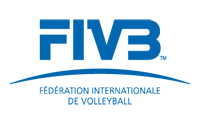
The Founding of FIVB:
A decisive moment in the history of volleyball’s first 100 years was certainly that of the founding of the FIVB (Federation Internationale de Volleyball) when in April 1947 representatives of 14 countries (Belgium, Brazil, Czechoslovakia, Egypt, France, Netherlands, Hungary, Italy, Poland, Portugal, Romania, Uruguay, USA and Yugoslavia) met in Paris under the leadership of France’s Paul Libaud to found the FIVB. Mr. Libaud, President of the French Federation, was elected first President of the FIVB. The headquarters were established in Paris, where they remained for the first 37 years until 1984 when Mexico’s Dr. Rubén Acosta took over the Presidency from Libaud.
FIVB Activities:
The FIVB's main activity is worldwide planning and organisation of volleyball events, sometimes in conjunction with other international governing bodies such as the IOC. This involves defining qualification procedures and competition formulae for tournaments, as well as more specific details such as player line-up and replacement restrictions, venues and hosts.
Amongst others, the FIVB organises the following international volleyball tournaments:
-Olympic Games
-World Championship
-World Cup
-World Grand Champions Cup
-World League (Men)
-World Grand Prix (Women)
-Club World Championship
and the following international under-age volleyball tournaments:
-Men's U23 World Championship
-Women's U23 World Championship
-Men's U21 World Championship (Junior)
-Women's U20 World Championship (Junior)
-Boys' U19 World Championship (Youth)
-Girls' U18 World Championship (Youth)
and the following international beach volleyball tournaments:
-Olympic Games
-World Championships
-World Tour
The FIVB also participates directly in the organization of continental volleyball events which have an attached international significance, such as Olympic and World Championship continental qualification tournaments.
FIVB Today and Tomorrow:
The FIVB consists of 220 affiliated federations and governs,manages and promotes all forms of volleyball and beach volleyball worldwide through tournaments such as the World Championships, World League, World Grand Prix, World Cup, Grand Champions Cup, Club World Championships, FIVB Swatch World Tour, FIVB Swatch World Championships, Beach Volleyball Continental Cup and Beach Volleyball World Cup, Junior and Youth tournaments and, of course, the Olympics.
To Visit FIVB Click Here.
Awards Related To Beach volleyball
AVP Awards:
AVP recognizes top performers as Beach Volleyball Tour
categories:
- Best blocker
- Best server
- Best defender
- Best offensive player
- Most improved player
- Newcomer of the year
- Most valuable player
- Team of the year
FIVB Beach Volleyball awards:
categories:
- Most Outstanding
- Best Blocker
- Best Defensive Player
- Best Hitter
- Best Offensive Player
- Best Setter
- Most Improved Player
- Most Inspirational
- Sportsperson(s)
- Best Server
- Top Rookie
- Team of the Year
Volleyball EnglandAnnual Awards:
Our sport wouldn’t be as successful as it is without the dedication, hard work and enthusiasm of our volunteers, coaches, clubs and players. Wether you’ve just become involved with volleyball or you’ve been with us for years we want to recognise your continued commitment to our sport through our Annual Awards evening.
categories:
- Young Coach of the Year
- Children’s Coach of the Year
- Participation Coach of the Year
- Performance Development Coach of the Year
- Overall coach of the year
- Young official of the year
- Referee of the year
- Services to refereeing
- Young Volunteer of the Year
- Volunteer of the Year
- Long Service Award
- HEVO of the Year
- Event of the Year
- Play of the Year (will be voted by the public)
- Club of the year
- Special Contribution to Volleyball
- Peter Wardale Award
- Hall of Fame
Sample Documents Of Beach volleyball
-Andre Agassi

